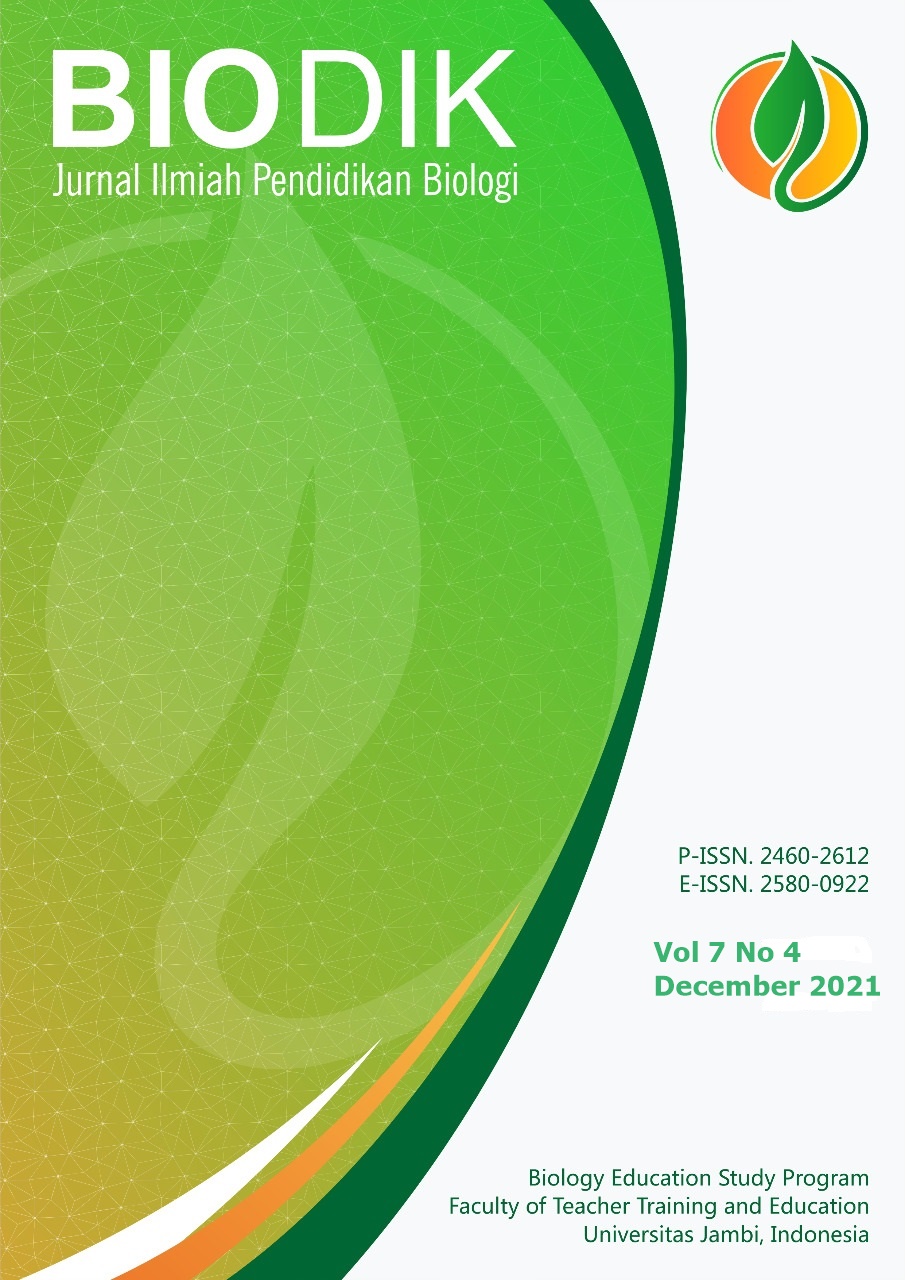Konstruksi Perangkat Pembelajaran Model Levels of Inquiry disertai Socio-Scientific Issues untuk Keterampilan Pemecahan Masalah
(Construction Levels of Inquiry Model Learning Tools accompanied Socio-Scientific Issues for Problem Solving Skills)
DOI:
https://doi.org/10.22437/bio.v7i4.13777Abstract
This study to analyze the need for problem solving skills of class X SMA Muhammadiyah 1 Pontianak, develop learning tools on ecosystem materials, and determine the validity and reliability of learning device. The research method used is Thiagarajan et al. The learning tools developed consisted of 6 lesson plans and 6 student worksheets based on the levels of inquiry accompanied by socio-scientific issues, handout, power point, and evaluation question. The results obtained were the validity of 6 lesson plans and 6 student worksheet, handout, power point, and evaluation question, namely v ≥ 0,8 (valid). The result of interrater reliability was using ICC on 5 lesson plans and 5 student worksheets, power point are 0,75-0,9 (good). While the reliability on 1 lesson plan and 1 student worksheets, handout, and evaluation question got a value of 0,5-0,75 (moderate). Developed learning tools were asserted worthy to use.
Abstrak. Penelitian ini bertujuan untuk menganalisis kebutuhan keterampilan pemecahan masalah siswa kelas X SMA Muhammadiyah 1 Pontianak, mengembangkan perangkat pembelajaran pada materi ekosistem, dan mengetahui validitas serta reliabilitas perangkat pembelajaran. Metode penelitian yang digunakan adalah Research and Development (R&D) mengacu pada model Four-D yang dikemukakan oleh Thiagarajan, dkk. Perangkat pembelajaran yang dikembangkan terdiri dari 6 buah RPP dan 6 buah LKPD berdasarkan tingkatan model levels of inquiry disertai socio-scientific issues, handout, power point, dan soal evaluasi. Diperoleh hasil validitas 6 buah RPP dan 6 buah LKPD, handout, power point, dan soal evaluasi yaitu v ≥ 0,8 (valid). Hasil reliabilitas antar rater menggunakan ICC pada 5 buah RPP dan 5 buah LKPD, media pembelajaran yaitu 0,75-0,9 (baik). Sedangkan reliabilitas pada 1 buah RPP dan 1 buah LKPD, handout, dan soal evaluasi mendapatkan nilai 0,5-0,75 (sedang). Perangkat pembelajaran yang dikembangkan dinyatakan layak untuk digunakan.
Downloads
References
Azwar, Syaiful. (2012). Reliabilitas Dan Validitas. Yogyakarta: Pustaka Pelajar.
Cahyani, Hesti, & Ririn Wahyu Setyawati. (2016). Pentingnya Peningkatan Kemampuan Pemecahan Masalah Melalui PBL Untuk Mempersiapkan Generasi Unggul Menghadapi MEA. PRISMA, Prosiding Seminar Nasional Matematika 151–60.
Koo, Terry K., & Mae Y. Li. (2016). A Guideline of Selecting and Reporting Intraclass Correlation Coefficients for Reliability Research. Journal of Chiropractic Medicine 15(2):155–63. doi: 10.1016/j.jcm.2016.02.012.
Lederman, Norman G., Judith S. Lederman, A. Nature, Norman G. Lederman, Judith S. Lederman, & Allison Antink. (2013). Nature of Science and Scientific Inquiry as Contexts for the Learning of Science and Achievement of Scientific Literacy. International Journal of Education in Mathematics, Science and Technology 1(3):138–47. doi: 10.18404/ijemst.19784.
Mazfufah, Nuzi Fahdia, Yanti Herlanti, & Yuke Mardianti. (2018). Increasing Scientific Reasoning within Discussion of Scientific Issues on Virus Topics. 3rd International Conferences on Education in Muslim Society (ICEMS). doi: 10.2991/icems-17.2018.39.
Morris, Lynn Lyons, & Carol Fitz-Gibbon Taylor. (1986). How to Measure Achievement. London: Sage Publicity.
Mourtos, Nj, Ndj Okamoto, & J. Rhee. (2004). Defining, Teaching, and Assessing Problem Solving Skills. 7th UICEE Annual Conference on Enginnering Education, (February 2004):9–13.
Nadiroh, N., V. Zulfa, & S. Yuliani. (2021). Learning Transformation of the 21stcentury Curriculum for Prospective Teacher in Term of Eco-Literacy. IOP Conference Series: Earth and Environmental Science 802(1). doi: 10.1088/1755-1315/802/1/012009.
Nana, A. Y. (2005). Microsoft Office Power Point. Bandung: Yrama Widya.
National Education Association. (2010). Preparing 21st Century Students Fo a Global Society: An Educator's Guide to the 'Four Cs'. Retrieved from www.nea.org.>assets>docs>A guide-toFour-cs.
Paraskeva-Hadjichambi, Demetra, Andreas Ch Hadjichambis, & Konstantinos Korfiatis. (2015). How Students’ Values Are Intertwined with Decisions in a Socio-Scientific Issue. International Journal of Environmental and Science Education 10(3):493–513. doi: 10.12973/ijese.2015.256a.
Peraturan Menteri Pendidikan dan Kebudayaan. 2016. Standar Proses Pendidikan Dasar Dan Kebudayaan. Retrieved from https://bnsp-indonesia.org/wpcontent/uploads/2009/06/Permendikbud_Tahun2016_Nomor022_Lampiran.pdf.
Prastowo, Andi. (2011). Panduan Kreatif Membuat Bahan Ajar Inovatif. Yogyakarta: Diva Press.
Sadler, Troy D., & Dana L. Zeidler. (2005). Patterns of Informal Reasoning in the Context of Socioscientific Decision Making. Journal of Research in Science Teaching 42(1):112–38. doi: 10.1002/tea.20042.
Suhaudi, Agus Jauhari dau Audi. (2010). Pengaruh Pembelajaran Pemecahan Masalah Secara Kelompok Kooperatif Terhadap Kemampuan Pemecahan Masalah. Jurnal Pendidikan Matematika Dan Sains 15(1):13–17.
Thiagarajan, Sivasailam, Dorothy S. Semmel, & Melvyn I. Semmel. (1976). Instructional Development for Training Teachers of Exceptional Children: A Sourcebook. Journal of School Psychology 14(1):75. doi: 10.1016/0022-4405(76)90066-2.
Wenning, Carl J. (2005). Levels of Inquiry: Hierarchies of Pedagogical Practices and Inquiry Processes. Journal of Physics Teacher Education Online 2(3):3–11.
Wenning, Carl J. (2011). The Levels of Inquiry Model of Science Teaching Wenning (2010) for Explications of Real-World Applications Component of the Inquiry Spectrum. A Levels of Inquiry Redux. Journal of Physics Teacher Education Online, 6(2):9–16.
Wijaya, Etistika Yuni, Dwi Agus Sudjimat, & Amat Nyoto. (2016). Transformasi Pendidikan Abad 21 Sebagai Tuntutan. Prosiding Seminar Nasional Pendidikan Matematika 2016, 263–78.
Downloads
Published
How to Cite
Issue
Section
License
Copyright (c) 2021 Afandi Afandi, Titin Titin, Yuyun Setyawati

This work is licensed under a Creative Commons Attribution-NonCommercial-ShareAlike 4.0 International License.
Copyright Notice
Authors who publish with Biodik : Jurnal Ilmiah Pendidikan Biologi agree to the following terms:
- For all articles published in Biodik : Jurnal Ilmiah Pendidikan Biologi, copyright is retained by the authors and grant the journal right of first publication with the work simultaneously licensed under a Creative Commons Attribution-ShareAlike 4.0 International Licensethat allows others to share the work with an acknowledgment of the work's authorship and initial publication in this journal.
- Authors are able to enter into separate, additional contractual arrangements for the non-exclusive distribution of the journal's published version of the work (e.g., post it to an institutional repository or publish it in a book), with an acknowledgment of its initial publication in this journal.
- Authors are permitted and encouraged to post their work online (e.g., in institutional repositories or on their website) prior to and during the submission process, as it can lead to productive exchanges, as well as earlier and greater citation of published work (See The Effect of Open Access).
















